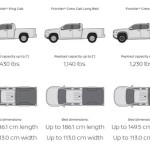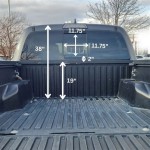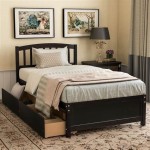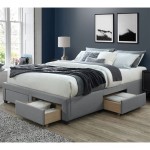Dog Bed Size for German Shepherds: A Comprehensive Guide
Selecting the appropriate dog bed is a crucial aspect of responsible pet ownership, directly impacting a German Shepherd's comfort, health, and overall well-being. Size is arguably the most important factor to consider when choosing a bed for this breed, as a bed that is too small can restrict movement and lead to discomfort, while one that is excessively large may not provide a sense of security.
German Shepherds are a large breed known for their intelligence, loyalty, and active nature. They require ample space to stretch out, relax, and recuperate, especially after rigorous physical activity. Therefore, understanding the nuances of dog bed sizing and how it relates specifically to the German Shepherd's unique characteristics is essential for providing optimal support and restful sleep.
Understanding German Shepherd Size and Growth
Before delving into specific bed sizes, it is important to understand the typical size and growth patterns of German Shepherds. Adult male German Shepherds generally stand between 24 and 26 inches tall at the withers (the highest point of their shoulders) and weigh between 65 and 90 pounds. Females are slightly smaller, typically measuring 22 to 24 inches in height and weighing 50 to 70 pounds. However, individual dogs can vary significantly, and factors such as genetics and diet can influence their size.
It is also crucial to consider the age of the German Shepherd. Puppies will require smaller beds initially, but it is often more economical and practical to purchase a bed that will accommodate their adult size. However, ensure the puppy feels secure in the larger bed; providing blankets or strategically placed toys can help create a cozier environment.
Accurately measuring the dog is paramount. Have the dog stand in a natural, relaxed position. Measure from the tip of their nose to the base of their tail. Add approximately 12-16 inches to this measurement to determine the minimum recommended length of the bed. If the dog prefers to sleep curled up, a slightly smaller bed might suffice, but erring on the side of larger is generally preferable, particularly for a breed as large as a German Shepherd.
Determining the Ideal Dog Bed Size: Length, Width, and Depth
The dimensions of a dog bed are typically expressed as length, width, and depth (or height). While length is the most critical factor, width and depth also play a significant role in overall comfort and support. A bed that is sufficiently wide will allow the dog to turn around comfortably and stretch out their limbs. The depth of the bed is important for providing cushioning and support, particularly for older dogs or those with joint problems.
For a fully grown German Shepherd, a large or extra-large dog bed is generally recommended. A large bed typically measures around 36-42 inches in length and 24-30 inches in width, while an extra-large bed can be 42-54 inches in length and 30-36 inches in width. These dimensions provide ample space for the dog to stretch out fully and change positions comfortably.
The depth of the bed should be at least 4-6 inches, especially for orthopedic beds designed to provide joint support. Thicker beds offer better insulation from cold floors and can help alleviate pressure points. However, for puppies or senior dogs with mobility issues, a bed with a lower profile may be easier to get in and out of.
Consider the dog's sleeping style when selecting the width and depth of the bed. Dogs who prefer to sleep curled up might be comfortable with a narrower bed, while those who stretch out fully will need a wider one. A bed with raised sides or bolsters can provide a sense of security and head support for some dogs, but others may prefer a flat, open bed.
Considerations Beyond Size: Material, Support, and Durability
While size is the primary consideration, other factors such as the material, support, and durability of the dog bed are equally important. German Shepherds are known for being powerful chewers and can be hard on their belongings, so choosing a durable and high-quality bed is essential.
The material of the bed should be both comfortable and easy to clean. Durable fabrics like canvas, denim, or microfiber are often good choices, as they can withstand regular wear and tear and are relatively easy to clean. Water-resistant or waterproof linings can also be beneficial, especially for dogs who are prone to accidents or drooling.
The type of support offered by the bed is crucial for the dog's comfort and joint health. Orthopedic beds made with memory foam or other supportive materials are particularly beneficial for older dogs or those with arthritis or hip dysplasia. These beds conform to the dog's body and provide pressure relief, helping to alleviate pain and improve sleep quality. However, even for younger, healthy dogs, a supportive bed can promote better posture and prevent joint problems in the long run.
Durability is another important consideration, particularly for a large and active breed like the German Shepherd. Look for beds with reinforced seams and durable construction that can withstand the dog's weight and activity. Chew-resistant materials can also help prevent the dog from destroying the bed prematurely. Reading reviews from other German Shepherd owners can provide valuable insights into the durability and performance of different dog beds.
In summary, selecting the right dog bed for a German Shepherd involves careful consideration of the dog's size, age, sleeping style, and individual needs. While a large or extra-large bed is generally recommended, it is essential to measure the dog accurately and choose a bed that provides ample space for them to stretch out and relax comfortably. In addition to size, factors such as the material, support, and durability of the bed should also be taken into account to ensure that the bed provides optimal comfort, support, and longevity.
Ultimately, the ideal dog bed will be one that the German Shepherd finds comfortable, supportive, and conducive to restful sleep. By taking the time to research and carefully consider all of these factors, owners can ensure that their canine companion has a comfortable and supportive place to rest their head.
Regularly inspect the dog bed for wear and tear. A damaged bed can pose a safety hazard if the filling is exposed, leading to ingestion or entanglement. Replace the bed as needed to maintain a safe and comfortable sleep environment for the German Shepherd.
Cleaning the dog bed regularly is also crucial for hygiene. This helps to remove dirt, hair, and allergens that can accumulate over time. Follow the manufacturer's instructions for cleaning, which may involve washing the entire bed or just the cover. Consistent cleaning practices contribute to the overall health and well-being of the dog.

Fluffy Fur Dog Bed And Thick Soft Cushion Comfortable Pet Crates Xxxl Dark Blue At 880 Piece Puppy In Chennai Id 2851302350233

A Complete Guide To Choosing The Best Dog Bed For Your

Dog Bed Petjett Calming Donut Medium Size For 20 45lbs Dogs Mercadolivre

A Guide On How To Choose The Right Size Dog Bed Gentledogtrainers Com Au

Dog Bed For German Shepherd Size Hotsell

Dog Bed For German Shepherd Petnap Heated

Custom Size Crate Dog Bed Cushion Cabinet Beds German Shepherd Handmade To Order Etsy

Big Barker 7 Pillow Top Orthopedic Dog Bed For Large And Extra Breed Dogs Headrest Edition

Large Dog Bed With Washable Removable Cover Extra Beds Xlarge Embroidered Name Personalized Navy Blue Etsy

Hundelustig Ml








